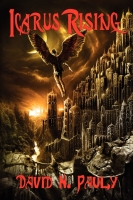Published by: Black Rose Writing
publication date: 2011 February
length: 520pgs price: $20.95
In Nostraterra, the wars between the allied races of Elves, Men and Dwarves have ended; the Dark Lord Magnar has been overthrown. The Great Peace is suddenly shattered when Alfrahil, Crown Prince of Eldora is nearly assassinated. The King suspects his younger son Daerahil’s lust for the throne has taken a dark and deadly turn, ignoring all evidence to the contrary. Is Daerahil the architect of this terrible plot or is he an unwitting pawn on someone else’s chessboard? In the forests of the Elves, it is whispered that Elven Prince Ferox plans to seize the lands of Nostraterra for himself. Aiding Daerahil and his allies, Ferox hopes to fuel a conflagration which will consume Eldora, leaving the lands of Nostraterra his for the taking.
Meanwhile, the Dwarves are wracked by deep divisions as the Flame Priests vie for supremacy, desiring to usurp all Dwarven power into their religion of segregation and hatred for other races. Secular Dwarf lords fight against the growing powers of the priests, trying to hold their kingdoms intact; preventing war from breaking out anew. In their distant refuge of Platonia, several pacifist Gracies are called from their pastoral home, embarking upon a great journey to aid the Magi, Oracle to the races. Transporting the last survivors of an ancient sentient race to the Magi’s Emerald Vale, the Gracies are waylaid by craven foes who seek the magic of these last ephemeral beings. Will they succeed, or will the magic of life itself be forever lost? Who wants to tear the world asunder, feasting upon the ruins of the kingdom of Men? Will the world descend into chaos, or will it be saved from the ambitious and craven who threaten all? The answers lie within which begins your journey through the magical lands of Nostraterra.
Contrary to the belief that JRR Tolkien cornered the market on fantasy literature with The Hobbit and Lord of the Rings and that everything else is just a knock-off of his work, there is a lot more to the genre than elves and dwarves and enchanted, magical rings. There are epic series such as The Song of Ice and Fire (which the HBO show Game of Thrones is based on), there are modern takes on elves and magic such as the Merry Gentry series by Laurell K. Hamilton, there are even the heroic tales of destiny like the Heralds of Valdemar multi-series by Mercedes Lackey. These tales are full of magic and mystery and other-worldly beings and great quests and perilous danger, and yet you never feel like you are just reading a bad copy of any of Tolkien’s work. They, amongst many other fine novels, prove that he didn’t have the be-all end-all vision when it comes to this genre. However, that doesn’t mean that all fantasy writers can manage to come up with stories that break away from the world Tolkien created. And unfortunately for Icarus Rising, it doesn’t even manage to come close.
There are elves here, and men, and dwarves, and little people that are similar to hobbits. There was a great war against an ultimate bad guy that all the races of the world had to band together to defeat. There is old animosity between dwarves and elves that at least two of their number manage to overcome due to circumstances and traveling together. The comparisons between this book and the Lord of the Rings are so obvious, in fact, that several times I had to remind myself I wasn’t reading fanfiction based on Tolkien’s work. Especially when the elves started going on about the “time of elves being over” and “the time of man being upon them.” Then they were all sailing away to the elf paradise and I was startled the author just didn’t outright call it Valinor and be done with it. Borrowing little elements from other novels to jump start your own ideas is reasonable, to a degree, but this isn’t like that. It’s borrowing on a full scale, in your face, impossible to ignore or justify basis. And in another unfortunate circumstance, Icarus Rising isn’t anywhere near as good a book as the source material it seems to borrow so liberally from.
In fact, reading this book is mentally exhausting. Each sentence is overstuffed with details – backstory, names, places, feelings, thoughts. One sentence was actually over 60 words long (I counted). I’ve read flash fiction that was shorter. By the time I’d read to the end of one incredibly long sentence I was so overwhelmed with information I couldn’t remember what happened at the beginning of the same sentence. There was just too much detail forced into every line, too many Important Places listed with Important Places capitalization and explanations, too many repetitions of the same information that I had trouble focusing on the first time. Even the summary on the back cover was too long and filled with too much information. If I had picked this up in a bookstore I wouldn’t have read all that text, and I doubt I would have ever bought the book. Most of the information given for the story was not revealed organically. It didn’t grow out of characters or action. Instead it was thrust into my face with long, overly-detailed, often repetitive (in details and word choices), explanations and boring flashbacks. In one instance there was even a flashback WITHIN another flashback. That was just confusing. As an editor once told me, a good story should be shown to you, not just told. Icarus Rising is almost all telling and no showing. 100 pages in I was dying for some real action to take place, not just a rehash of action that had already taken place a long time ago.
Really, reading the first half of this novel was interminable. Wizard’s First Rule (by Terry Goodkind) is at nearly twice as long and I read it in a fifth of the amount of time it took to make it through Icarus Rising. Besides being difficult to read through, it was confusing, with strange time shifts taking place early on that were not pointed out properly so I couldn’t figure out what was going on for several pages. Names and places and battles were talked about in a manner as if the reader should already be familiar with them and I actually thought perhaps this was the second book in a series and another must exist somewhere with those previous events. As far as I can tell this isn’t the case though. In the second half of the book the action starts to pick-up but then it gets confusing again. For over 200 pages we’ve had basically only two points of view – from Alfrahil and Daerahil, the human princes. Then suddenly, without a new part being broadcast or any other kind of warning, there were chapters from characters I’d never met before who seemed to be important. I was wary to care about them, however, as they could have disappeared just as quickly as they appeared.
Speaking of the characters, I didn’t like them – couldn’t like them. Alfrahil and Daerahil were flat and two dimensional, and kind of jerks to be honest. While the author tried his best to explain why they were really “good guys” and deserving of respect, the actions they took spoke differently. They were weak and angry and naïve and too old to be as immature and downright stupid as they had a tendency to be. Their father the King was a close-minded bigot, their friends only appeared when needed to spout obvious wisdom and to remind the reader of how “normal” and “human” they really were, and everyone else was given so little background and depth that they didn’t even really count as characters at all. I don’t need to like every single character in every single book that I read, but I need at least one person that I can relate to or look up to or want to be best friends with.
I couldn’t find anyone like that here. And while I know this book was written by a man and maybe he had only a male audience in mind for it, I was still greatly disturbed by the treatment of female characters in it. The one “warrior” woman who makes an appearance is talked about as being fierce in bed but no other reason is given for why one of the prince’s soldier friends wanted to marry her. When her husband is injured she’s up in arms about it for all of about six seconds. Then the prince gives one little apology and she completely changes her tune. I’m sorry but I have been a woman for a long time now and I know how my emotions ride, and I’m not even some mythical Valkyrie or anything, and I KNOW that I would be upset for a lot longer and it would take a lot more than a few words from some prince (who is kind of a tool really) to make me feel better. The majority of the rest of the women that make any kind of appearance in the story are prostitutes who get passed around from man to man or lower class women who the princes can sleep with but never marry. This doesn’t stop them from hiking up their skirts though. As this is presented as a society with more medieval morals, you would assume that women were expected to remain virgins until their wedding nights or else suffer censure from their entire community. The fact that they are so willing to get naked with a guy that won’t ever marry them seems out of place and more than a little demeaning.
Epic fantasy is big and complex and full of characters and battles and strange happenings. It should truly FEEL epic when you are reading it. Icarus Rising does not manage to catch on to the trick of being full without getting bogged down by things. It doesn’t feel EPIC, it feels LONG. Too long. And it doesn’t feel like its own story. It is something I’ve read elsewhere and done a lot better before. I can applaud the author for sitting down and writing a long book and selling it to a publisher. That takes time and effort and resilience (as only someone with a folder full of dozens of rejection letters from publishers as well can really understand). But being able to write a book is different than being able to write a good book, and in that this author still has a long ways to go.
“So the writer who breeds more words than he needs, is making a chore for the reader who reads.” – Theodore Geisel
 Horror News | HNN Official Site | Horror Movies,Trailers, Reviews
Horror News | HNN Official Site | Horror Movies,Trailers, Reviews

![11163008[1]](https://horrornews.net/wp-content/uploads/2011/08/111630081-297x165.jpg)
